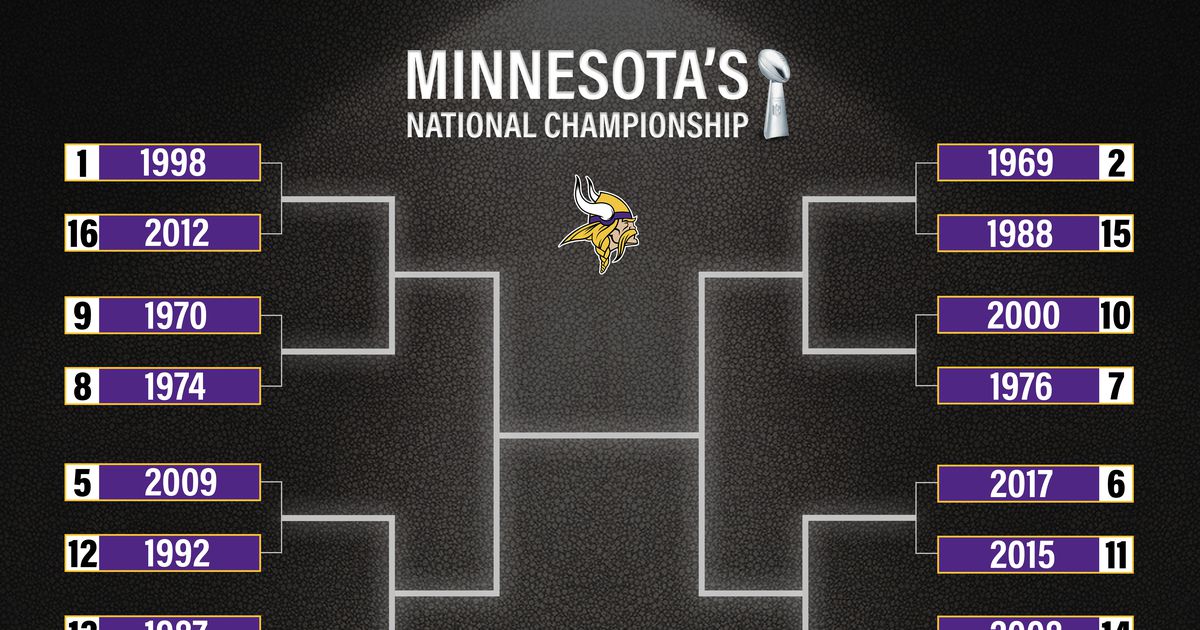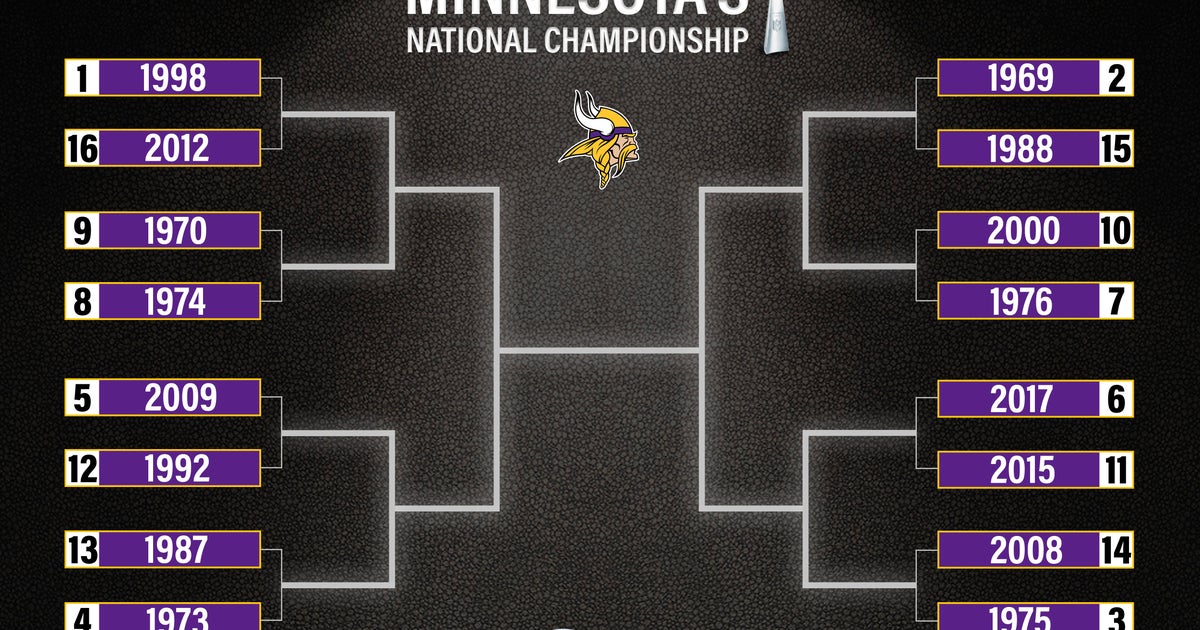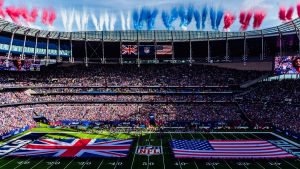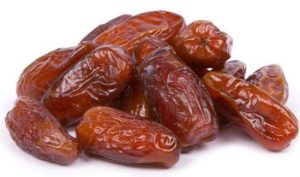All-time Minnesota Vikings tournament: Bracket, seeds, team capsules


In case you haven’t heard, we’re killing some time during these strange sports-less days by putting together a simulated Minnesota Vikings tournament that will decide, once and for all, the best team in franchise history. For more information on how the tourney will be structured, click here. For further reasoning on the seeding, read on:
(Click here for a printable PDF of the bracket. Print it out, fill it in and post a picture of your bracket on Twitter using the hashtag #VikingsAllTimeTournament)
No. 1 seed: 1998
Record: 15-1
Postseason result: Lost NFC championship
Outlook: The top seed in our tournament goes to arguably the most electric offense in NFL history. Cris Carter and rookie Randy Moss caught passes from Randall Cunningham, a 35-year-old quarterback who took over as the starter under center in Week 3 when Brad Johnson was sidelined with an injury. Moss went on to catch the most touchdown receptions as a rookie in NFL history (17), and the Vikings racked up a then-record 556 points in the regular season. This was undoubtedly the most dominant, fun and yes, heartbreaking, season in Vikings history. Meet your No. 1 seed.
Vikings All-Time Tournament
2 seed: 1969
Record: 12-2
Postseason result: Lost Super Bowl IV
Blurb: The identity of the Vikings franchise wouldn’t be the same without this trailblazing team. Minnesota ranked first in both scoring defense and offense in 1969 as the Purple People Eaters — the defensive line of Allen Page, Carl Eller, Jim Marshall and Gary Larsen – established the Vikings as one of the most feared defenses in football.
3 seed: 1975
Record: 12-2
Postseason result: Lost divisional round
Blurb: This season can be remembered by three words: Pearson pushed off. That refers, of course, to a controversial non-call on a reception by receiver Drew Pearson late in a playoff game that helped the Cowboys to a 17-14 win and ended the Vikings’ storybook season. So why is this team ranked ahead of three other Super Bowl squads? It was quarterback Fran Tarkenton’s MVP season and six players were named All-Pros.
4 seed: 1973
Record: 12-2
Postseason result: Lost Super Bowl VIII
Blurb: The Purple People Eaters cruised to a 9-0 start to the season and mauled Washington and Dallas in the postseason before, unfortunately, falling to Miami in Super Bowl VIII. Chuck Foreman, the 12th overall pick in the 1973 draft, rushed for 801 yards (4.4 average) as a rookie.
5 seed: 2009
Record: 12-4
Postseason result: Lost NFC championship
Blurb: In the words of Brett Favre, “the pieces are in place.” Favre, who terrorized Vikings defenses for almost two decades, joined the purple for a memorable season. As he clashed with head coach Brad Childress, Favre posted a career-best 107.2 passer rating, but unfortunately threw one too many interceptions in the postseason. Sigh.
6 seed: 2017
Record: 13-3
Postseason result: Lost NFC championship
Blurb: Pass is … caught! Diggs! Sideline! Touchdown! The Minneapolis Miracle rewrote decades and decades of heartbreak for the Vikings faithful and might be the best single play in franchise history. Unfortunately, the magic didn’t carry into the NFC Championship and Minnesota came up one game short of “bringing it home” to Minneapolis for Super Bowl LII.
7 seed: 1976
Record: 11-2-1
Postseason result: Lost Super Bowl XI
Blurb: We dip back into the best decade of Vikings football for the 1976 team. The defense was still elite, giving up the second-fewest points per game (12.6) in the league. But that didn’t stop Ken Stabler, Cliff Branch and Dave Casper (and head coach John Madden) from scoring a boatload of points in the Oakland Raiders’ 32-14 win in Super Bowl XI.
More Vikings coverage
8 seed: 1974
Record: 10-4
Postseason result: Lost Super Bowl IX
Blurb: Minnesota won double-digit games for the fifth time in six years, propelled by its stellar defense once again. Defensive back Nate Wright hauled in six interceptions and Paul Krause, Eller, Foreman and Tarkenton were all named to the Pro Bowl. But the Purple People Eaters ran into the Steel Curtain in Super Bowl IX and lost 16-6 in Super Bowl IX.
9 seed: 1970
Record: 12-2
Postseason result: Lost in divisional round
Blurb: This 1970 squad slid down to the ninth seed because of an early exit in the postseason – a surprising 17-14 loss to the 10-3-1 San Francisco 49ers. But this roster could do some damage. It tallied the fourth-best point differential in franchise history at plus-192 points, trailing the 1998 team (plus-260), 1969 (plus-246) and 1975 (plus-197). Page and Eller held down the defensive line and were both named All-Pros.
10 seed: 2000
Record: 11-5
Postseason result: Lost NFC championship
Blurb: A much different team than those defensive forces in the 1970s, the 2000 team ranked fifth in the NFL in points scored (397) and 24th in points allowed (371). In his third season, Moss caught 77 passes for 1,437 yards and a league-high 15 touchdowns. Carter would go on to play two more seasons, but the 2000 campaign marked his last with 1,000+ receiving yards at 1,274. Hopefully we won’t see any 41-donut scores in our fictional tournament like we did in the NFC title game.
11 seed: 2015
Record: 11-5
Postseason result: Lost in wild-card round
Blurb: Hey Teddy, hey Teddy! Bridgewater, the 32nd overall pick in 2014, played all 16 games for the first (and as of 2020, the only) time in his career. A 22-year-old Stefon Diggs emerged as Bridgewater’s favorite target as the quarterback passed for 3,231 yards, 14 touchdowns and nine interceptions. But the real story here is head coach Mike Zimmer’s defense. Zimmer inherited the worst defense in football when he took over in 2014. But just two years later, his 2015 unit went on to rank fifth in points allowed and guide the Vikings to a division title. Do we even have to mention how this season ended?
12 seed: 1992
Record: 11-5
Postseason result: Lost in wild-card round
Blurb: After missing the playoffs in back-to-back seasons, the Vikings moved on from Jerry Burns and hired Dennis Green, a 43-year-old offensive-minded coach from Stanford. The Vikings thrived in Green’s debut season. Despite struggles at quarterback between Rich Gannon and Sean Salisbury, who combined for 17 TDs and 15 INTs, Minnesota ranked fourth in points scored. Terry Allen totaled 1,679 yards from scrimmage and 15 TDs himself as the Vikings rolled to a division title in a weak NFC Central.
13 seed: 1987
Record: 8-7
Postseason result: Lost NFC championship
Blurb: Minnesota took on plenty of turbulence during the 1987 campaign. The Vikings started 2-0 but lost the next three games that were played by replacement players during an NFL strike. A four-game winning streak in November was just enough to get the Vikings into the playoffs. Minnesota, led by Joey Browner, Chris Doleman and Scott Studwell on defense, surprised everyone by crushing New Orleans in the wild-card round and shocked the world the following weekend by taking down San Francisco 36-24. The Vikings came up one score short of a fifth Super Bowl appearance, losing 17-10 to Washington in the NFC championship game. We wouldn’t mind seeing a few upsets in this tournament. This 1987 team can bring it.
14 seed: 2008
Record: 10-6
Postseason result: Lost in wild-card round
Blurb: Adrian Peterson had already set the football world on fire during his Rookie of the Year campaign in 2007. He followed it up by gaining a league-high 1,760 rushing yards and 10 TDs in 2008, making an offense that was quarterbacked by Gus Frerotte and Tavaris Jackson look … decent. Remember Bernard Berrian? He was the Vikings’ leading receiver with 48 catches for 964 yards and seven TDs.
15 seed: 1988
Record: 11-5
Postseason result: Lost in divisional round
Blurb: The late 1980s under Jerry Burns brought back what Vikings fans were used to seeing with Bud Grant’s teams in the 1970s — defense, defense and a little more defense. Chris Doleman and Keith Millard tallied eight sacks apiece and Carl Lee intercepted eight passes for the Vikings, who allowed 10.8 points per game and held opponents to three points or less in four consecutive games from Nov. 13-Dec. 4, 1988. But Minnesota met San Francisco in the second round of the playoffs and could only watch as Joe Montana tossed three TDs in a 34-9 rout.
16 seed: 2012
Record: 10-6
Postseason result: Lost in wild-card round
Blurb: Coming off an ACL tear, an injury that was thought of as the kiss of death for running backs, the expectations for Peterson in 2012 were low. But he likely exceeded even his own hopes, rushing for 2,097 yards — just eight yards short of Eric Dickerson’s single-season record set back in 1983. Christian Ponder rode the coattails of Peterson to 10 wins and a wild-card berth, clinched with a 37-34 win over rival Green Bay in the regular-season finale. The following week, Minnesota — with Joe Webb starting at quarterback instead of an injured Ponder – lost to the Packers 24-10 and Peterson’s special season was abruptly ended.








